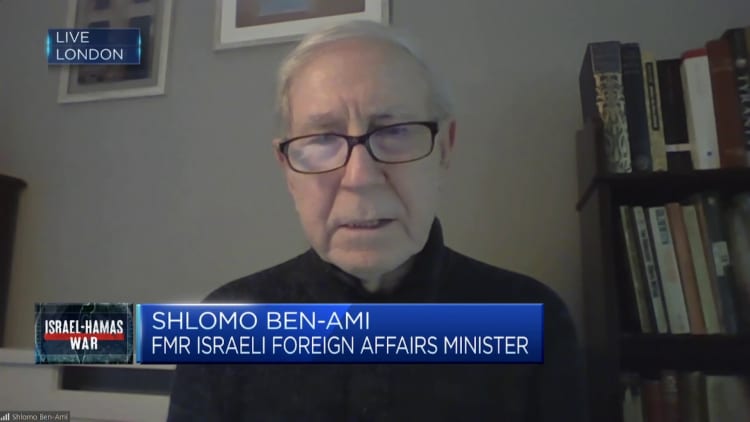U.S. Ambassador to the United Nations Linda Thomas-Greenfield votes on a resolution calling for an immediate ceasefire in Gaza during a United Nations Security Council meeting on the situation in the Middle East, including the Palestinian issue, at the UN -Voice Headquarters New York on March 25, 2024.
Angela Weiss | Afp | Getty Images
The United Nations Security Council passed a resolution on Monday calling for an immediate ceasefire between Israel and the Palestinian militant group Hamas after the United States abstained from the vote – prompting Israel to cancel a high-level delegation’s visit to Washington.
Israeli Prime Minister Benjamin Netanyahu had warned before the vote that the delegation’s visit would be canceled unless Washington vetoed the request. The U.S. abstention signals a growing rift between the White House and the current Israeli government, the most right-wing in its history, nearly six months after the start of its war against Hamas in the Gaza Strip. The Israeli offensive in the Gaza enclave in response to Hamas’ October 7 terrorist attacks has killed tens of thousands of people.
“This is a clear retreat from the consistent U.S. position in the Security Council since the beginning of this war,” said a statement from Netanyahu’s office, adding that “this withdrawal harms both the war effort and efforts to release the abductees. “”
The US denied that the abstention represented a change in its policy. Some observers see it differently.
“It’s a breakthrough. An abstention by a permanent member of the UN Security Council is a yes, because it means that they do not exercise their veto and fundamentally agree with the text, even if they do not want to say so, said Hussein Ibish, a senior scholar at Arab said Gulf States Institute in Washington told CNBC.
“The U.S. refusal to protect Israel from a resolution it passionately opposes by not granting veto power is an extraordinary thing.”

The resolution was the first of its kind since the start of the war and called for an immediate cessation of hostilities between Israel and the Palestinian militant group Hamas for two weeks. This broke a five-month impasse in which the US vetoed three UN calls for a halt to the fight. The motion also called for the immediate and unconditional release of all hostages held by Hamas in the Gaza Strip.
State Department spokesman Matthew Miller said Washington’s reasons for not approving the measure included a lack of condemnation of the Hamas terror attack that killed about 1,200 people in Israel and took about 240 other people hostage.
However, Miller added: “The reason we didn’t veto it is because that resolution also contained things that were consistent with our long-term position, most notably that there should be a ceasefire and the release of hostages.” “, which we also understood to be the position of the Israeli government. So it’s a little surprising and unfortunate that they don’t appear to be attending these meetings.”
“The United States is losing patience”
The move follows condemnation of Netanyahu by a number of US lawmakers – most notably Senate Majority Leader Chuck Schumer, the highest-ranking Jewish member of Congress, who is known for his steadfast support of the Israeli government for years .
“In this case, abstention is a very strong signal to Israel that the United States is losing patience,” Ibish said.
The canceled Israeli delegation‘S The visit to Washington was intended to discuss Israel’s planned military operation in Rafah, the southernmost corner of the Gaza Strip, where more than a million displaced Palestinians are seeking refuge and where Israel says the majority of remaining Hamas fighters are based.
The Biden administration has warned against a Rafah operation, saying it is already failing because Israel is blocking aid deliveries to the besieged strip. Earlier this year, the United Nations warned that half a million Palestinians were at risk of famine.
Smoke rises after the Israeli bombardment in central Gaza City March 18, 2024, amid ongoing fighting between Israel and the militant group Hamas.
– | Afp | Getty Images
For former Israeli Foreign Minister Shlomo Ben Avi, the rift between the two longtime allies poses a serious threat to Israel’s security – and the blame lies with Netanyahu.
When asked by CNBC’s Dan Murphy if the US and Israel are now at a turning point in the war, Ben Avi said:
“I think we definitely are. This is a crisis [and] The Americans are sending a strong message that they do not agree with the way Israel is waging the war and that they believe now is the moment to begin a political process.”
He added: “The whole attitude of confronting the Americans instead of serving their interests, which are essentially the interests of Israel, works against the security of the nation. Netanyahu has become a threat to Israel’s security by waging war from day one. With him, domestic political consideration is more [important] than to meet Israel’s strategic interests.”
“America is tired of this war,” the former minister said, “especially Netanyahu, who is not behaving like a loyal ally and showing no gratitude for America’s political and military help in this war.”
CNBC has reached out to the Israeli prime minister’s office for comment.
Source link
2024-03-26 10:32:38
www.cnbc.com






